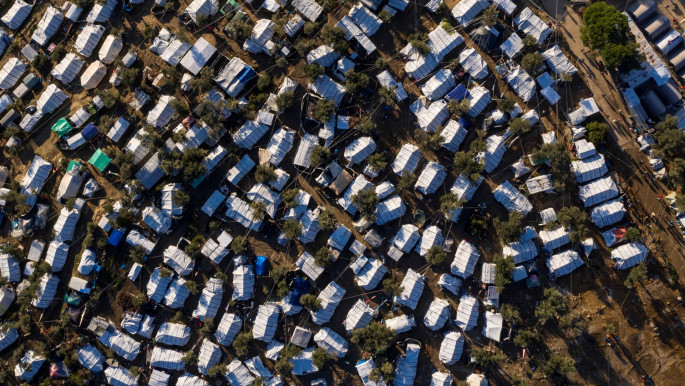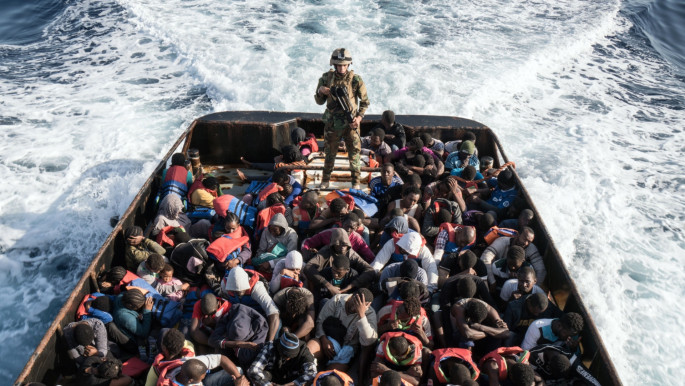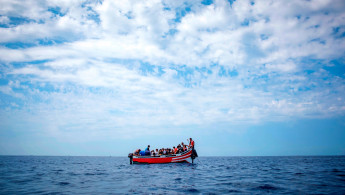Frontex: The border agency at the heart of Europe's migrant pushback scandal
Their breadth and weight suggest that the practice of 'pushbacks' are rife, and that the European Union's border system is surviving by violating its own laws.
What is Frontex?
Frontex is the European Union's border agency. It was established in 2004 in tandem with the weakening of internal borders within the Union with the aim of strengthening the protection of external borders. Its first operation targeted 'illegal workers'; non-EU nationals entering to work, often temporarily and in hard conditions.
Frontex has been one of the greatest beneficiaries of the continent's fervour around migration over the last six years, ballooning from 309 workers and a budget of €143.3 million to 2,000 workers and a projected budget of €543.5 million in 2021.
Secret and illegal deportations
Pushbacks are the illegal deportation of people who are crossing a border, committed in secret and denied in the open. Mega Rebin (name changed for anonymity), 27, grew up in Iraqi Kurdistan, but was forced to flee five years ago. Rebin survived a pushback earlier this year by border guards that he believes were stationed by Frontex.
 |
Since 2014, allegations of illegal and violent practices by both national border guards and guards deployed by the EU agency Frontex have been mounting |  |
Rebin tried to travel to Albania after finding life in Greece unliveable. He travelled with a close friend Felix, 25, from Liberia. The two friends attempted the crossing under the cover of darkness.
"We reached the town of Blicht and that's where they caught us. First an Albanian car came and caught us, and then they called the French and German police officers - they must have been from Frontex," says Rebin.
Rebin says the guard's processing of him and Felix was inconsistent.
 |
|
| Read more: Moria camp tragedy is a wake-up call for Europe's failed migration policy |
"They took my fingerprints, but they ignored Felix. Then we were driven over the border and back into Greece along with some other people who had been trying to move, and that's where they left us," says Rebin.
Under both international law and European Union law, the Albanian authorities have the obligation to register Rebin and Felix's arrival and to offer them the option to claim asylum. Only after they have assessed this claim as insubstantial is it legal to forcibly deport them.
Violence and returning to war zones
Rebin believes that they were lucky to get off lightly. "In Bulgaria it is worse. They take you, beat you, and burn your things. If you have money, they'll take your money. Then they'll drag you back to Turkey," he said.
The Black Book compiles testimonies of pushbacks from 12,654 people. At its launch, German MEP Cornelia Ernst described the incidents it compiles as "sadistic, merciless, humiliating and degrading". The book details pushbacks from Italy to Greece, Croatia, Slovenia and Hungary along the so-called 'Balkan Route', suggesting potential 'refoulement'; chains in which people experience multiple push backs that send them towards the country they originally fled from.
 |
The only reason we know that Frontex and the national border guards are committing this violence is because civil society was able to monitor the situation |  |
Pushbacks by sea
Testimonies like Rebin's are common, and many of them are not only happening by land; reports against coast guards have also been mounting. In 2020, analysis by The New York Times detailed the secret and illegal expulsion of over 1,000 asylum seekers by sea. Coast guards employed by the Greek government forced people seeking asylum onto flimsy orange inflatable life rafts and towed them to the edge of Greece's territorial waters. They then abandoned them without a motor.
The Greek government denies any wrongdoing, but leaked documents describe a "seemingly incessant ping pong" of these rafts between the Greek and Turkish coast guard boats, often with boats or personnel stationed by Frontex in observer status.
Gagging the messengers
Frontex has undermined its own human rights workers that might speak out about such abuses. Speaking in secret for fear of losing their livelihood, Greek border guards disclosed that Frontex's executive director Fabrice Leggeri made it clear to workers that "reporting pushbacks involving Frontex personnel is not a route to popularity or promotion".
The New Arab reported in January that New Democracy's government had placed gagging restrictions on workers and volunteers in refugee camps in Greece.
 |
|
| Read more: How Greece is silencing NGOs to hide abuses at refugee camps |
Manos Moschopoulos works for Open Society, a European non-profit that has been monitoring the European Union's border regime. Moschopoulos suggests that such gagging laws are a tactic for suppressing the allegations.
"The only reason we know that Frontex and the national border guards are committing this violence is because civil society was able to monitor the situation. The Greek government and Frontex are trying to obscure these incidents by eliminating civil society oversight and thereby hiding them from the public," says Moschopoulos.
Zero arrivals
"The pushbacks are occurring in a political environment in which reducing arrivals at all costs has become an obsession," says Moschopoulos.
The Minister for Migration in Greece has regularly cited 'zero arrivals of refugees' as the core aim of his office. This policy has been supported by high-ranking EU officials, who have described Greece as the 'protector' of Europe. As war and violence continue to displace people in nearby countries, people will continue to make this journey.
"We do not do this for fun. When we made our journey, the rain was pouring and we were exhausted. I could barely walk. Our bodies were shaking. If things were not this bad then people wouldn't put themselves through this danger," says Rebin.
 |
The pushbacks are occurring in a political environment in which reducing arrivals at all costs has become an obsession |  |
Defending a European-wide border system
In the pushback that Rebin describes, EU border guards are preventing people from an EU country (Greece) from moving into a non-EU country (Albania).
"Frontex involvement in alleged pushbacks from Albania to Greece is telling of the way that European Union migration management positions Greece," Moschopoulos says.
The border apparatus that has been governing this relation since 2003 is referred to as the Dublin Convention. Under European Union law, states have the obligation to protect refugees residing in their territory. The Dublin Convention requires people to seek protection in the first European Union country that they enter. This effectively outsources the protection obligation to the states on the geographic southern border; mostly, to Greece.
"The European Union is keen to keep people fenced within Greece, even though Greece has proven time and time again it cannot provide even the basics to keep these people alive," says Moschopoulos.
 |
|
| Cashing in on misery: Despite Covid-19, North Africa's human traffickers are thriving |
The alleged pushbacks suggest that the European Union has suspended the rule of its own laws in the borderlands in order to enforce its border regime.
Suspension of the rule of law
Moschopoulos draws comparisons between the lawlessness at the European Union's borderlands and the actions of police officers in city centres.
On 7 March, a police officer was filmed beating a man on a grassy square in the Athenian suburb of Nea Smyrni. Further violence occurred when 10,000 people protested against police brutality the following week, with video footage suggesting that officers pointed loaded guns into crowds. In another, they appear to shout "we will kill you".
"In both cases, the law enforcement apparatus is choosing to ignore the law. Both the civil police and the border guards operate supposedly in the name of the people, to keep us safe. Both end up leaving us less safe because the rule of law is suspended," says Mosochopoulos.
Meanwhile, Rebin is preparing to face the border guards again. "We know that we have very few chances of succeeding," he says. "But they leave us with no other choice".
Keira Dignan is a freelance journalist and librarian based in Athens, Greece.
Follow her on Twitter: @DignanKeira



